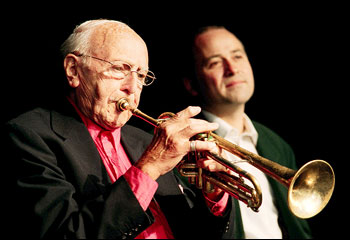|
Story from
the
Telegraph
Jazz
trumpeter whose professional career began in the swing
era and ended in the 1990s
Tommy
McQuater, who died on January 20 aged 93, was a veteran
of the inter-war British jazz scene.
Once
described as "the brightest young British trumpet
soloist of his era", he continued working at the highest
professional level into the 1990s. He was one of the
rare players able to combine the diverse roles of lead
trumpet and soloist, and he perhaps failed to gain his
full credit as a jazz musician.
|
|
 |
|
Tommy McQuater:
played with George Chisholm in the 1930s and
with the Muppets in the 1970s |
Thomas
Mossie McQuater was born at Maybole, Ayrshire, on
September 4 1914. Largely self-taught, he began playing
the cornet at the age of 11 and within a short time
became a member of the Maybole Brass Band. He played for
local dances while at school, and in his mid-teens
turned professional with Louis Freeman's band at Green's
Playhouse, Glasgow. Freeman also supplied bands to
transatlantic liners, enabling McQuater to visit the
United States and South America while still a teenager.
Spotted
by the bandleader Jack Payne in 1934, McQuater played
with his band in London and Paris before joining Lew
Stone's band in 1935, where he replaced Nat Gonella,
Britain's first jazz trumpet star.
From
September 1936 McQuater played with the Ambrose
orchestra, as a member of which he was now among the
élite of the popular music world. During those years he
made many jazz recordings, notably with the American
bandleader and multi-instrumentalist Benny Carter
(1936-37), the Swing Rhythm Boys (1936) and Danny Polo
and his Swing Stars (1937). In these unbuttoned
circumstances his fiery, sometimes explosive, playing
sounds remarkably advanced for the period.
Judging
that this might be the moment to launch a pure swing
band, as distinct from a dance band which played
occasional swing numbers, in February 1939 McQuater
joined with a fellow Scot, the trombonist George
Chisholm, and eight others to form the Heralds of Swing.
This
brave co-operative venture met with mixed fortunes. It
secured a residency at the Paradise Club and appeared at
two of the rare jazz concerts to be held in London. In
the spring of that year, however, it was forced to
disband through lack of work. Briefly revived for two
broadcasts and another concert, it expired in September,
on the outbreak of war.
Called
up in 1940, McQuater soon found himself in familiar
company, along with Chisholm and several other Heralds
of Swing, in the RAF Dance Orchestra, known
(unofficially at first) as the Squadronaires. McQuater
eventually rose to the rank of corporal.
Partly
as a result of the presence of American troops, the
influence of American swing became strong during the war
years. It was particularly marked in the music of the
Squadronaires, whose members declared themselves
impressed by Glenn Miller's Army Air Force Band and,
especially, Sam Donahue's Navy Band.
Swing
grew into such a craze that even Victor Sylvester, the
doyen of strict tempo ballroom dancing, found himself
unable to ignore it. The bizarre result was Victor
Sylvester's Jive Band, a specially formed group
featuring McQuater and Chisholm, which made a number of
records in 1944-45. The sound of two feisty Scots
jazzmen manfully restraining themselves in the interests
of strict-tempo decorum constitutes their chief
attraction today.
So
popular did the Squadronaires become that they stayed
together as a civilian band after the war, finally
disbanding in 1964. McQuater, however, left to become a
freelance musician, and in 1952 he joined the
Skyrockets, resident band at the London Palladium.
The
following year he joined the BBC Show Band, under the
leadership of Cyril Stapleton, combining this with
freelance work in the burgeoning film, television and
recording industry. He can be seen playing in the cult
British thriller All Night Long (1961).
From
the early 1960s McQuater was a member of Jack Parnell's
ATV orchestra, providing music for all that company's
programmes, principally Sunday Night At The London
Palladium.
In 1976
The Muppet Show went into production at Borehamwood
studios, with music by the cream of the London freelance
world. McQuater played the entire run, from 1976 to
1981, and his trumpet provided the sound of the manic
"Lips", a member of the Muppet band, Electric Mayhem.
In
later years McQuater concentrated once more on his jazz
playing. He formed an alliance with fellow-trumpeter
Johnny McLevy and they performed together at London jazz
venues and, in particular, at the annual Ealing Jazz
Festival, where he was a kind of de facto
artist-in-residence.
His
last playing appearance took place there, just before
his 90th birthday.
Although self-taught himself, McQuater was an effective
and inspiring teacher. The well-known trumpeters whom he
helped during their early years include Pat Halcox, Alan
Elsdon, Digby Fairweather and Ian Carr.
Tommy
McQuater is survived by two sons, both professional
musicians. |